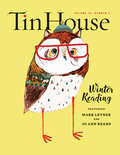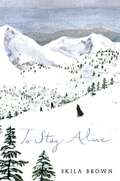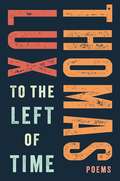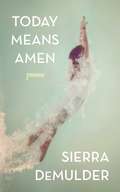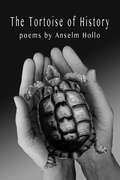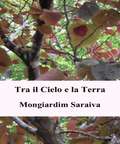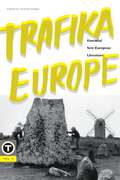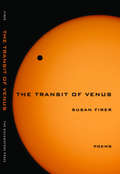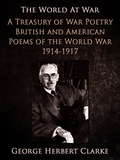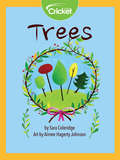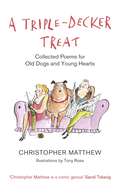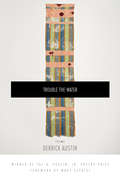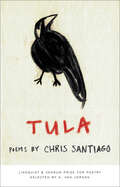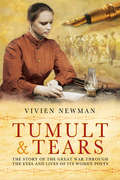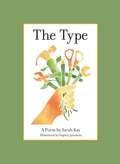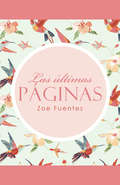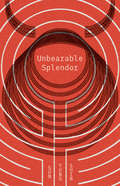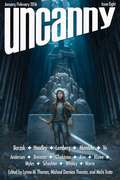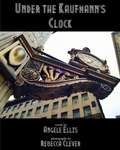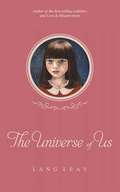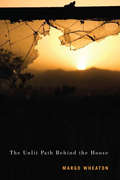- Table View
- List View
Tin House: Winter Reading 2016 (Tin House Magazine)
by Holly Macarthur Rob Spillman Win MccormackThe Winter 2016 issue of Tin House features new fiction, essays, and poetry from longtime favorites and new voices. The Winter 2016 issue of Tin House features new fiction, essays, and poetry from longtime favorites and new voices. Thaw your icy heart with Tin House this Winter. Pour a mug of hot cocoa and cozy up with new fiction, essays, and poetry from fireside favorites and discover New Voices for the new year.
To Stay Alive: Mary Ann Graves And The Tragic Journey Of The Donner Party
by Skila BrownTold in riveting, keenly observed poetry, a moving first-person narrative as experienced by a young survivor of the tragic Donner Party of 1846.<P><P> The journey west by wagon train promises to be long and arduous for nineteen-year-old Mary Ann Graves and her parents and eight siblings. Yet she is hopeful about their new life in California: freedom from the demands of family, maybe some romance, better opportunities for all. But when winter comes early to the Sierra Nevada and their group gets a late start, the Graves family, traveling alongside the Donner and Reed parties, must endure one of the most harrowing and storied journeys in American history. Amid the pain of loss and the constant threat of death from starvation or cold, Mary Ann’s is a narrative, told beautifully in verse, of a girl learning what it means to be part of a family, to make sacrifices for those we love, and above all to persevere.
To the Left of Time
by Thomas LuxA brilliant new collection of poems by Kingsley Tufts Award-winning poet Thomas Lux With To the Left of Time, Thomas Lux adds more than fifty new poems to his celebrated oeuvre. Broken into three sections, these include semi-autobiographical poems, odes, and a final section that delves into a variety of subjects reflective of Lux's imaginative range. Full of his characteristic satire and humor, this new collection promises laughter and profound insight into the human condition. To the Left of Time is a powerful addition to the work of one who has been widely praised for his ability to offer image- and metaphor-driven visions as well as lines of plain language and immediacy. This collection proves that Lux's work will continue to inspire readers for decades to come.
To the Left of Time
by Thomas LuxA brilliant new collection of poems by Kingsley Tufts Award–winning poet Thomas Lux With To the Left of Time, Thomas Lux adds more than fifty new poems to his celebrated oeuvre. Broken into three sections, these include semi-autobiographical poems, odes, and a final section that delves into a variety of subjects reflective of Lux’s imaginative range. Full of his characteristic satire and humor, this new collection promises laughter and profound insight into the human condition. To the Left of Time is a powerful addition to the work of one who has been widely praised for his ability to offer image- and metaphor-driven visions as well as lines of plain language and immediacy. This collection proves that Lux’s work will continue to inspire readers for decades to come.
Today Means Amen
by Sierra DeMulder<P>Dear you: <P>Whoever you are, <P>However you got here, <P>This is exactly where you are supposed to be. <P>This moment has waited its whole life for you. <P>These are the opening lines of "Today Means Amen," YouTube star Sierra deMulder’s immensely powerful and virally popular poem, which lends its title to this collection. Like her fellow Millennial poets Tyler Knot Gregson, Clementine von Radics, and Lang Leav, Sierra has the gift of speaking directly to the reader. “Today Means Amen” has become an anthem of sorts to thousands, who find themselves reflected in its pain, its fierceness, its tenderness — but also in its triumphant culminating refrain: <P> You made it <P>You made it <P>You made it <P>Here. <P>The poems in Sierra's new book explore the rocky terrains of love, family, and womanhood with this same remarkable honesty and generosity. Today Means Amen brings this important young poet's work to an even broader audience.
The Tortoise of History
by Anselm HolloFrom "Art History":Someone comes alonggives that tedious old thinga new twist orbreaks its neckthe old questionsdon't change:what do you want me to say?what do you want me to do?Anselm Hollo (1934-2013) authored more than forty books and was an award-winning translator. Born in Helsinki, Finland, he was fluent in German, Swedish, Finnish, and English by age ten. Hollo eventually settled in the United States in 1966, where he taught at Naropa University in Boulder, Colorado.
Tra il Cielo e la Terra
by Antonio Carlos Mongiardim Gomes Saraiva Annalisa Farina"Tra il Cielo e la Terra", em inglês, espanhol, italiano, espanhol, espanhol e português. As informações seguintes não estão ainda disponíveis em Português. Para sua comodidade, disponibilizamos uma tradução automática: Cielo onírico, lutar e delle grandi verità do nostro io profondo, sembra aver bisogno di una comunione e di un'integrazione forte with the Natura e l'Universo, nella sua dimensión infinita ... Questo mondo è rappresentato in quest'opera Con la "Poesia". L'altra metà, i "Testi" (prosa), introduzir a sensação da realidade real e cruda do cimento terrene e comuni. Ancora sorgono, in questo contesto, frammenti di idee e pensieri su temi qua coinvolgono e integrano. È in questa costante e dinamica alternância para a ópera e a realização, cercando de condume il lettore su una strada tortuosa e suggestiva. Dove le preoccupazioni, i dubbi, i sogni e le realizzazioni, sono parte integrante dello stesso viagra misterioso ed emocionante che è la vita.
Trafika Europe: Essential New European Literature, Vol. 1
by Andrew SingerIn volume 1 of Trafika Europe, Andrew Singer gathers choice offerings from the first year of the quarterly journal of the same name. These fourteen selections—from seven women and seven men, seven poets and seven fiction writers—represent languages across the Continent, from Shetland Scots and Occitan, Latvian and Polish, Armenian, Italian, Hungarian, German, and Slovenian to Faroese and Icelandic. With some of the most accomplished writing in new translation from Europe today, this volume opens a window onto some emerging contours of European identity. Former ASCAP director of photography Mark Chester complements the writing with sumptuous black-and-white photos.The contributors are Vincenzo Bagnoli, Ewa Chrusciel, Christine DeLuca, Mandy Haggith, Stefanie Kremser, Aurélia Lassaque, Wiesław Myśliwski, Jóanes Nielsen, Edvīns Raups, László Sárközi, Marko Sosič, Jón Kalman Stefánsson, Nara Vardanyan, and Māra Zālīte.
Trafika Europe: Essential New European Literature, Vol. 1
by Andrew SingerIn volume 1 of Trafika Europe, Andrew Singer gathers choice offerings from the first year of the quarterly journal of the same name. These fourteen selections—from seven women and seven men, seven poets and seven fiction writers—represent languages across the Continent, from Shetland Scots and Occitan, Latvian and Polish, Armenian, Italian, Hungarian, German, and Slovenian to Faroese and Icelandic. With some of the most accomplished writing in new translation from Europe today, this volume opens a window onto some emerging contours of European identity. Former ASCAP director of photography Mark Chester complements the writing with sumptuous black-and-white photos.The contributors are Vincenzo Bagnoli, Ewa Chrusciel, Christine DeLuca, Mandy Haggith, Stefanie Kremser, Aurélia Lassaque, Wiesław Myśliwski, Jóanes Nielsen, Edvīns Raups, László Sárközi, Marko Sosič, Jón Kalman Stefánsson, Nara Vardanyan, and Māra Zālīte.
The Transit of Venus
by Susan FirerIn Firer's poems, place, often the western shore of Lake Michigan, provides an imagistic and sonic landscape in which language explores the 'empire of skin' with its daily happinesses and sorrows, gifts and losses. Often blue light illuminates these poems and frequently the language of a Catholic childhood shows up. Ezra Pound and William Carlos Williams's poems say 'Use everything,' and Firer does: receipts, anatomy, astronomy, clothes poles, paintings, checklists, quagga mussels, questions and grapefruit. Birds fly through these poems, insights too: 'For a minute / we are disguised / as human.' That quote concisely sums up Firer's main attentions: transience and time and with what and how we fill our brief time here on earth.
A Treasury of War Poetry British and American Poems of the World War 1914-1917 (The World At War)
by George ClarkeThis book contains poetry from numerous countries all centred around the subject of war. Primarily British and American poems dating from 1914 to 1917 have been collected in this edition by the editor George Clarke. The subject matter of these poems encompass patriotism, courage, self-sacrifice, enterprise, and endurance. Authors included are V Lindsay, Galsworthy, Kipling and others. (Excerpt from Goodreads)
A Triple-Decker Treat: Collected Poems for Old Dogs and Young Hearts
by Christopher MatthewStepping into the lower deck of Christopher Matthew's Triple-Decker Treat, we discover that not only can a Le Creuset casserole be very dangerous in the wrong hands, but so too can Pilates, open-air opera in evening dress, weekending in Wales with a pug, and pushing a trolley in Waitrose.Next deck up, we meet a menagerie of assorted dogs - among them a spaniel who was once a big star of TV commercials, a Camp Bastion war hero, an overweight pug with ambitions to be a sheepdog and a psychotic Great Dane called Cher Bebe.Finally, on the top deck, we negotiate the pleasures and pitfalls of romance in later years. Love is revealed in the most unlikely places, with the most unlikely people seeking it.Often very funny and always touching, these delightful and stirring verses about cast-iron cookware, rear-fixated puppies and late-flowering love are a celebration of everything life has to offer.
A Triple-Decker Treat: Collected Poems for Old Dogs and Young Hearts
by Christopher MatthewStepping into the lower deck of Christopher Matthew's Triple-Decker Treat, we discover that not only can a Le Creuset casserole be very dangerous in the wrong hands, but so too can Pilates, open-air opera in evening dress, weekending in Wales with a pug, and pushing a trolley in Waitrose.Next deck up, we meet a menagerie of assorted dogs - among them a spaniel who was once a big star of TV commercials, a Camp Bastion war hero, an overweight pug with ambitions to be a sheepdog and a psychotic Great Dane called Cher Bebe.Finally, on the top deck, we negotiate the pleasures and pitfalls of romance in later years. Love is revealed in the most unlikely places, with the most unlikely people seeking it.Often very funny and always touching, these delightful and stirring verses about cast-iron cookware, rear-fixated puppies and late-flowering love are a celebration of everything life has to offer.
Trouble the Water
by Derrick AustinRich in religious and artistic imagery, Trouble the Water is an intriguing exploration of race, sexuality, and identity, particularly where self-hood is in constant flux. These intimate, sensual poems interweave pop culture and history—moving from the Bible through several artistic eras—to interrogate what it means to be, as Austin says, fully human as a “queer, black body” in 21st century America.
Tula: Poems
by Chris SantiagoA debut poetry collection exploring themes of family and identity while examining the experiences of a second-generation Filipino immigrant in America.Tula: a ruined Toltec capital; a Russian city known for its accordions; Tagalog for “poem.”Prismatic, startling, rich with meaning yet sparely composed, Chris Santiago’s debut collection of poems—selected by A. Van Jordan as the winner of the 2016 Lindquist & Vennum Prize for Poetry—begins with one word and transforms it, in a dazzling sleight of hand, into a multivalent symbol for the immigrant experience. Tula: Santiago reveals to readers a distant land devastated by war. Tula: its music beckons in rhythms, time signatures, and lullabies. Tula: can the poem, he seems to ask, build an imaginative bridge back to a family lost to geography, history, and a forgotten language?Inspired by the experiences of the second-generation immigrant who does not fully acquire the language of his parents, Tula paints the portrait of a mythic homeland that is part ghostly underworld, part unknowable paradise. Language splinters. Impossible islands form an archipelago across its landscape. A mother sings lullabies and a father works the graveyard shift in Saint Paul—while in the Philippines, two dissident uncles and a grandfather send messages and telegrams from the afterlife.Deeply ambitious, a collection that examines the shortcomings and possibilities of both language and poetry themselves, Tula introduces a major new literary talent.Praise for Tula“A book that both transports us and transforms us.” —Viet Thanh Nguyen“A debut collection that is a spare, elegant engagement with language. . . . Santiago’s struggles with identity are well-explored, but his linguistic savvy and precision truly stand out.” —Publishers Weekly“Santiago seems to recognize that words will always hold power, even as their meanings evolve. Through everything, Tula delves into these nuances of language: how it is suppressed, how it is weaponized, how it loves, how it informs, and how it is often as fleeting as a birdsong. Tula is therefore a celebration of the ephemeral and the permanent, a lovely testament to the beauty of contradiction.” —Chicago Review of Books
Tumult & Tears: The Story of the Great War Through the Eyes and Lives of Its Women Poets
by Vivien NewmanDuring the First World War and its immediate aftermath, hundreds of women wrote thousands of poems on multiple themes and for many different purposes. Womens poetry was published, sold (sometimes to raise funds for charities as diverse as Beef Tea for Troops or The Blue Cross Fund for Warhorses), read, preserved, awarded prizes and often critically acclaimed. Tumult and Tears will demonstrate how womens war poetry, like that of their male counterparts, was largely based upon their day-to-day lives and contemporary beliefs. Poems are placed within their wartime context. From war worker to parent; from serving daughter to grieving mother, sweetheart, wife; from writing whilst within earshot of the guns, whilst making the munitions of war, or whilst sitting in relative safety at home, these predominantly amateur, middle-class poets explore, with a few tantalising gaps, nearly every aspect of womens wartime lives, from their newly public often uniformed roles to their sexuality.
The Type
by Sarah KaySarah Kay's powerful spoken word poetry performances have gone viral, with more than 10 million online views and thousands more in global live audiences. In her second single-poem volume, Kay takes readers along a lyrical road toward empowerment, exploring the promise and complicated reality of being a woman. During her spoken word poetry performances, audiences around the world have responded strongly to Sarah Kay's poem The Type. As Kay wrote in The Huffington Post: "Much media attention has been paid to what it means to 'be a woman,' but often the conversation focuses on what it means to be a woman in relation to others. I believe these relationships are important. I also think it is possible to define ourselves solely as individuals... We have the power to define ourselves: by telling our own stories, in our own words, with our own voices."Never-before-published in book form, The Type is illustrated throughout and perfect for gift-giving.
Las últimas páginas
by Zoe Fuentes<P>Poemario de amor de una joven voz de hoy en día. <P>Amor en todas sus formas: ése ha sido el tema elegido por Zoe Fuentes para los versos recogidos en este libro. <P>Desde los enamoramientos más apasionados hasta los limbos entre el amor y el odio o las luchas interminables por olvidar a alguien, la autora logra plasmar todos esos sentimientos en esta colección de poemas que promete hacer revivir al lector sus viejos amores o bien, encontrar desahogo para los actuales. <P> Tiene en sus manos no sólo la obra de una autora joven, sino un escrito lleno de pasión que lo llevará a preguntarse por la profundidad y complejidad de las emociones humanas.
Unbearable Splendor
by Sun Yung Shin"To graph the immigrant, the exile and 'pseudo-exile,' as 'a kind of star.' To perform childhood. 'Descent upon descent.' To write on '[p]aper soaked in milk.' Unbearable Splendor is a book like this, that is this: the opposite or near-far of home. What is the difference between a guest and a ghost? What will you feed them in turn? I was profoundly moved by the questions and deep bits of feeling in this gorgeous, sensing work, and am honored to write in support of its extraordinary and brilliant writer, Sun Yung Shin."-Bhanu Kapil"In Unbearable Splendor, Sun Yung Shin sticks a pin directly into the heart of who we are to reveal that a person is a mystery without beginning or end, borders or documents, complicated by robotics and astrophysics, arrivals and departures, myth and rewriting. A person is divided into multiple, complicated selves, as various and complex as the forms and approaches she employs in these poetic essays. To read Shin's work is to marvel at a rosebud's concealed and silent core and to slowly witness its elegant blooming. It is a delicate and majestic show."-Jenny Boully"Unbearable Splendor is a dazzling collage of biophysical metamorphoses, wherein the 'I' atomizes into multiple and self-replicating new mythologies of what constitutes an authentic being. 'I didn't know I wasn't human. My past was invented, implanted, and accepted. I'm more real than you are because I know I'm not real.' In our vast expanse, where 'every species is transitional,' Shin's lyricism, erudition, and tonal command of loss and indignation harmonize into a singular nucleus that hums and pulsates through each of these wondrous poetic meditations."-Ed Bok Lee
Uncanny Magazine Issue Eight
by Uncanny MagazineFeaturing all–new short fiction by Maria Dahvana Headley, Nghi Vo, Christopher Barzak, Brit Mandelo, and Rose Lemberg, classic fiction by Sarah Rees Brennan, nonfiction by Chris Kluwe, Max Gladstone, Isabel Schechter and L.M. Myles, poems by Kayla Whaley, Leslie J. Anderson, and Bryan Thao Worra, interviews with Maria Dahvana Headley and Christopher Barzak, and Priscilla H. Kim’s “Round Three” on the cover.
Under the Kaufmann's Clock: Fiction, Poems, and Photographs of Pittsburgh
by Angele EllisAngele Ellis’s obsession with remembering the past ...results in a tremendous variety of poems—narrative, lyric, narrative-lyric blur, prose poems—and flash fiction pieces—which differ widely in style, tone, and length... We are privileged to enjoy the writings of such a talented, caring, versatile author. Readers will also want to linger over Under the Kaufmann’s Clock in order to savor the photos by Rebecca Clever. —Eileen Murphy, Crab Fat Magazine <P><P>[T]he city’s many histories, both public and private, emerge in non-linear glimpses and portraits, lyric moments and micro-narratives... The approach to these moments is tender, curious. The poems follow these ghosts, haunt them even, and appear to feel the tenderness is mutual… —Sally Rosen Kindred, Pittsburgh Poetry Review
The Universe of Us (Lang Leav Ser. #4)
by Lang LeavInternational best-selling author of Love & Misadventure, Lullabies (Goodreads Readers Choice Award), and Memories Lang Leav presents a completely new collection of poetry with a celestial theme in The Universe of Us. <P><P>Planets, stars, and constellations feature prominently in this beautiful, original poetry collection from Lang Leav. Inspired by the wonders of the universe, the best-selling poetess writes about love and loss, hope and hurt, being lost and found. Lang's poetry encompasses the breadth of emotions we all experience and evokes universal feelings with her skillfully crafted words.
The Unlit Path Behind the House
by Margo WheatonThe day's an old room / stripped of its furniture; there are / never enough beds in winter. / By late afternoon, the shadows / are forming a blue inconsolable hall // as sparrows retreat to makeshift / cots of pine bark and eaves. // Even the parched marsh grass / has stilled, every blade / become an ear. Sensuous, atmospheric, and spare, The Unlit Path Behind the House collects poems that seek light in difficult places. In lines filled with an intense music, Margo Wheaton listens for the lyricism inside the day's blessings and catastrophes. Wheaton's poems sing at the intersections where public and private worlds collide: the steady cadence of a boy carrying an unconscious girl in his arms, the afternoon journey of a woman taking books to prisoners, the rhythmic breathing of a homeless man asleep in a parking lot. In these works, fireflies pulse in the dark, lovers clasp and unclasp, and street signs sing like Blake's angels. Deeply informed by the natural world, Wheaton's writing is marked by great meditative depth; while passionately engaged, these poems evoke a field of mystery and stillness. Whether exploring themes of isolation, spiritual dispossession, desire, or the sanctity of daily rituals, The Unlit Path Behind the House conveys our longing for home and the different ways we try to find it.
The Unlit Path Behind the House (Hugh MacLennan Poetry Series #35)
by Margo WheatonThe day’s an old room / stripped of its furniture; there are / never enough beds in winter. / By late afternoon, the shadows / are forming a blue inconsolable hall // as sparrows retreat to makeshift / cots of pine bark and eaves. // Even the parched marsh grass / has stilled, every blade / become an ear. Sensuous, atmospheric, and spare, The Unlit Path Behind the House collects poems that seek light in difficult places. In lines filled with an intense music, Margo Wheaton listens for the lyricism inside the day’s blessings and catastrophes. Wheaton’s poems sing at the intersections where public and private worlds collide: the steady cadence of a boy carrying an unconscious girl in his arms, the afternoon journey of a woman taking books to prisoners, the rhythmic breathing of a homeless man asleep in a parking lot. In these works, fireflies pulse in the dark, lovers clasp and unclasp, and street signs sing like Blake’s angels. Deeply informed by the natural world, Wheaton’s writing is marked by great meditative depth; while passionately engaged, these poems evoke a field of mystery and stillness. Whether exploring themes of isolation, spiritual dispossession, desire, or the sanctity of daily rituals, The Unlit Path Behind the House conveys our longing for home and the different ways we try to find it.
